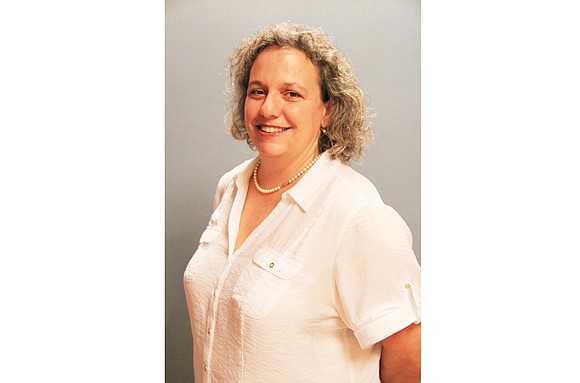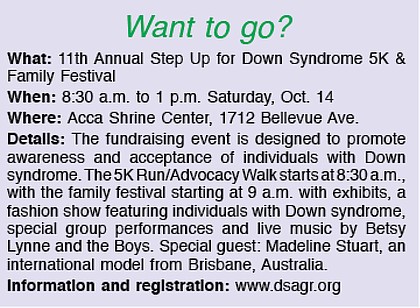Personality: Angela Cimmino
Spotlight on board president of Down Syndrome Association of Greater Richmond
9/29/2017, 6:44 a.m.
Angela Cimmino found out three days after her son’s birth that he had Down syndrome. “We were a bit shell-shocked,” she recalls.
But just weeks later, she and her husband attended their first meeting of the Down Syndrome Association of Greater Richmond, and it “was like someone throwing us a lifeline,” she says.
“Folks were so welcoming. Just seeing kids and adults with DS doing ‘normal stuff’ with their families — eating pizza, running around with siblings and friends. It gave us a sense that ‘It’s going to be OK.’ ” That was 15 years ago.
Her son, Neil, is thriving, is home-schooled and attends a variety of activities on a regular basis, Ms. Cimmino says.
Since then, Ms. Cimmino has been involved with the association, whose mission is to help individuals with Down syndrome and their families through support, education, community awareness and advocacy.
In January, the Powhatan County resident was elected president of the DSAGR’s volunteer board. On Oct. 14, the organization will host its largest fundraiser of the year, the 11th Annual Step Up for Down Syndrome 5K & Family Festival. The family-oriented event will offer information about Down syndrome while highlighting performances and a fashion show featuring individuals with Down syndrome.
The event supports the programs and resources of DSAGR, which serves Richmond, Charlottesville, Williamsburg and Central Virginia.
DSAGR’s small staff and dedicated volunteers provide a variety of fun and enrichment programs for all age groups. Programs include education initiatives for ages 5 through 9; transition boot camp for teens and their parents; a summer employment academy for ages 16 through 21; adult employment skills development; a First Call program for new parents with a DS child who can call upon experienced parents; an education conference for parents and educators; and social programs for various age groups.
The association also serves as an information resource for individuals and families with a lending library of books, videos, DVDs, magazines and other materials.
According to the Centers for Disease Control and Prevention, approximately one in every 700 babies in the United States is born with Down syndrome, making Down syndrome the most common chromosomal condition. About 6,000 babies with Down syndrome are born in the United States each year.
“Parents with a DS child ask ourselves all the time, ‘What will the future be for our children?’ ” Ms. Cimmino says. “To me, sometimes you have to put the question aside and deal with today. “Being in the organization and on the board is a great help in understanding challenges individuals and families face,” Ms. Cimmino says. “We provide programs and awareness to help families face those challenges every day.”
Ms. Cimmino says DSAGR has grown by leaps and bounds, not only in the number of families and geographic area served, but also in the quality of programs and services it offers. “It’s my privilege,” she says, “to have an opportunity to give back to this organization that has provided so much support for our family over the years.”
Meet this week’s Personality and advocate for those with Down syndrome, Angela Cimmino:
Occupation: Freelance medical writer.
Top volunteer position: President of the board, Down Syndrome Association of Greater Richmond.
Date and place of birth: Jan. 24 in Queens, N.Y.
Current residence: Powhatan County.
Education: Bachelor’s of science in pharmacy, St. John’s University, New York; doctor of pharmacy, Virginia Commonwealth University.
Family: Husband, Ben Lent, and children, Madelyn Lent, 18, and Neil Lent, 15.
When DSAGR was established: 1983.
Number of volunteers: 2,700 volunteer hours from our families and community volunteers.
What is Down syndrome: Down syndrome occurs when an individual has a full or partial extra copy of chromosome 21. It usually causes delay in physical, intellectual and language development. There is wide variation in development in individuals with Down syndrome, with each individual having his/her own unique personality, capabilities and talents.
Some signs of Down syndrome: A few of the common physical traits of Down syndrome are low muscle tone, small stature, an upward slant to the eyes and a single deep crease across the center of the palm. Each person with Down syndrome is a unique individual and may possess these characteristics to different degrees or not at all.
How to deal with diagnosis: The most important thing to keep in mind is that a Down syndrome diagnosis is not as “life changing” as the fact that one has a new baby. And in most ways, that baby will be just like other infants, needing to be fed, held and, most of all, loved. The DSAGR First Call program offers parents new to our community a group of experienced parents to call upon whether they’ve received a prenatal or postnatal diagnosis. We’ll be honest and do our best to describe the joys and challenges we’ve experienced along the way. We make hospital visits and provide a Welcome Kit that includes up-to-date resources about Down syndrome and resources available to new parents and their infants. Our services are free and confidential. Email firstcall@dsagr.org or call 804-447-4713.
Biggest challenges for DSAGR: Effectively serving underserved areas and populations, particularly in the city of Richmond, and developing and maintaining funding streams to allow us to focus less effort on fundraising and even more effort on serving our families.
What needs to be done: Educating and empowering parents and individuals with DS are integral parts of DSAGR’s mission. We believe that knowledge is power, and that parents and self-advocates can only effectively advocate for the supports their children or they need to realize their potential if they are aware of what supports are available and how to access them. We also engage with the wider community to increase awareness and appreciation of the value and abilities of individuals with DS.
Issues that affect adolescents and adults with Down syndrome and their families include: Continued meaningful inclusion with their peers in all aspects of high school life; employment opportunities to develop job skills, particularly the social “soft skills” vital to successful employment in any job; opportunities for continued meaningful, gainful employment in adulthood; and viable, supported, independent living options.
Transition planning for families to prepare child for independent adult life includes: The process is really a series of decisions and transitions that take many years and require much effort, planning and time on the part of families. The primary areas of focus are typically employment, living arrangements and leisure time. Parents educating themselves regarding available opportunities, services, programs, etc., and how to access them is key. Several of DSAGR’s services and programs can help in this regard.
How I start the day: In the words of Pete the Cat, “It’s all good.”
A quote that I am inspired by: “We can’t help everyone, but everyone can help someone.”
How I unwind: I’ve been practicing tai chi for about 12 years. It’s a centuries old Chinese martial art and a wonderful mind-body exercise.
Something I love to do that most people would never imagine: In addition to the traditional tai chi “hand form,” there’s a tai chi sword form. So, yeah, I have a sword — not a sharp one — and I practice with it.
Best late-night snack: Peanut butter.
Three words that best describe me: Family-oriented, introverted and intelligent.
Quality I most admire in another person: Attentive listener.
Greatest source of inspiration: My kids.
The book that influenced me the most: “The Book of Tao: Tao Te Ching” by Lao Tse.
What I’m reading now: “The Great Courses: Your Best Brain” by John J. Medina.
Next goal: For DSAGR to grow our outreach to underserved populations of families with loved ones with DS.








